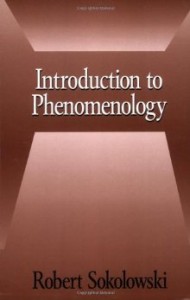AR: What exactly is phenomenology? How does it differ (or does it differ?) from the mainstream philosophy of any given historical period? What about phenomenology gives equips it with a “plausible vocabulary” for talking about the human person?
TP: As regards your first question, I suppose that to arrive at a rough sense of phenomenology as a philosophical project, we ought to recall the distinction between the “natural” and the “phenomenological” attitude. As rational animals, we are inherently called upon to draw such a distinction inasmuch as ours is “the paradoxical condition of both having the world and yet being part of it,” as Robert Sokolowski puts it.
It is only “when we move into the phenomenological attitude, we become something like detached observers … onlookers, [and] we contemplate the involvements we have with the world and with things in it” (cf. Sokolowski, Introduction to Phenomenology, 44-48) that we fully engage our rational potential. At the same time, in so doing, we also begin to understand its limits, and both of these steps, taken together, strike me as the beginning of philosophy. Yet this reflexive stance vis-à-vis our involvement in the world, understood as something always already given, does not amount to our unilaterally taking possession of the world. On the contrary, it implicitly asks us to acknowledge the antecedent givenness of both world and other minds (past and present) and, hence, saddles us with the lifelong task of achieving some awareness of how both other minds and the world as it has been variously conceived cumulatively impinge on us and positively (in)form our noetic grasp of reality.

Yet unlike Cartesian rationalism or a Nietzschean, psychological skepticism that opposes all talk of certainty (and “certitude”), phenomenology does not seek to overcome this antecedent and ambient “world” by dissolving it into propositional certainties or, alternatively, declaring it to be a sheer sequence of shifting illusions. By contrast, Husserl points out that the Cartesian view of philosophy originating in a methodical unmasking of appearances as deceptive is fundamentally mistaken. For it fails to account for the anterior, sheer “givenness” of that appearance, however deceptive, as such (cf. MtM 29). Philosophical reflection begins not with doubt but with a moment of certitude, a certitude whose correlate is not some empirical object but the reality of “appearance” (Erscheinung) as something indubitably given.
What makes the phenomenological approach particularly value is precisely its epistemological humility, its emphasis on a formal description (rather than a unilateral dominion over) of the mind-world relationship. Robert Sokolowski and Jean-Luc Marion strike me as having articulated that feature especially well.
As regards the question of how phenomenology relates to “mainstream philosophy of any given historical period,” that is a rather complex and varied story. Its origins, I think, must undoubtedly be sought in Plato whose many dialogues can be understood as a constant back and forth aimed at drawing out and scrutinizing the “natural attitude” of his interlocutors and then, gradually, staging for us the paradoxes, tensions, and outright contradictions slumbering within it. Yet that very endeavor is also necessarily open-ended, a constantly renewed, trans-generational project of educating the young into a reflective frame of mind that enables them to take reflexive ownership and responsibility for their practices and assumptions, and thus to come to see them in their broader relation to a transcendent to agathon. Unsurprisingly, humans (generally a self-absorbed and impatient species) have always struggled with the idea of a pursuit whose rewards seem so tenuous and whose telos is categorically unattainable.
The antagonist to that dialectical interplay of the natural and the phenomenological stance, as Plato had seen so clearly, is a model of philosophy as a body of compact, distinct, and readily teachable propositions, a matter of syllogistic skill and rhetorical technique rather than wisdom slowly acquired over the course of a life. Phenomenology in the twentieth century, no less than Platonic dialectics in its time, has had to establish itself against the alluring, at times brazenly confident ministrations of positivism, reductionism, or a type of analytic minimalism – modes of inquiry far more concerned with formal correctness, logical consistency, and irrefutability than with disclosing new, broadly significant meanings. Others (e.g., Martha Nussbaum, Charles Taylor, Hans-Georg Gadamer, especially in his writings on Plato) have commented insightfully on the running battle between a Platonic, process-based conception of philosophical inquiry and its technocratic counterfeit (for which the Sophists remain the archetype), the latter being a mode preoccupied with correctly concluding than reflecting on the dialectical progression of inquiry as an intrinsically meaningful way of achieving a phenomenological perspective on one’s natural standpoints, assumptions, and valuations.
At the same time, the great challenge of phenomenology was to pursue this mode of inquiry without dissolving into a wholly contingent, empirical “psychologism” (as Husserl called it). It would go beyond the scope of this forum to detail how and why that was accomplished, though Husserl’s Logical Investigations (esp. no. 5 and his attendant exploration of Inner-Time Consciousness (Inneres Zeitbewußtsein) and Image Consciousness (Bildbewußtsein) were crucial steps for salvaging, not just phenomenology but philosophy in general from being absorbed by empirical, social-science-type modes of inquiry.












